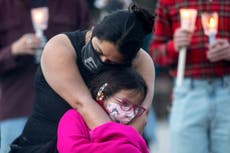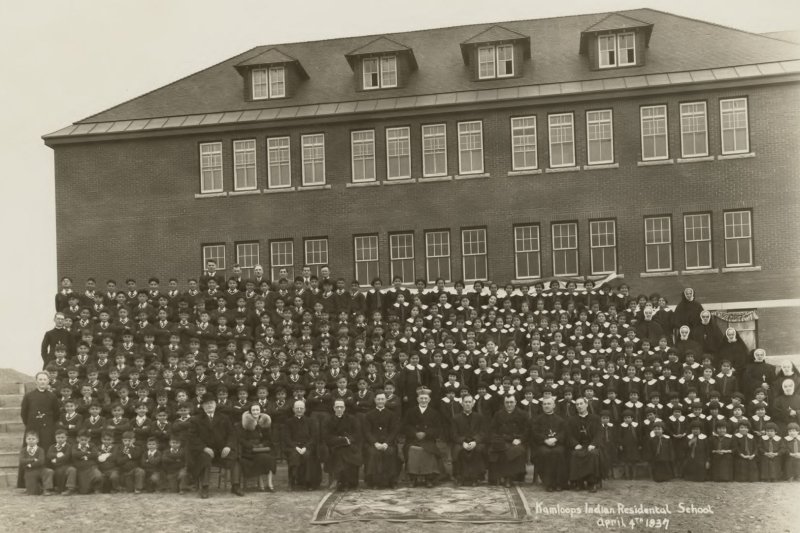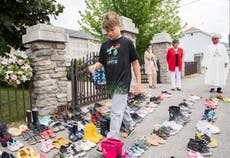Indigenous leaders have called for investigations into every residential school site in the country
THE INDEPENDENT
Canada's Prime Minister Justin Trudeau said the discovery of more than 200 children buried at a former Indigenous residential school was not an isolated incident.
The prime minister's comments were made on Monday as Indigenous leaders called for an inquiry into every former residential school site across the nation, the Associated Press reports.
The schools were used to house and educate children taken from Indigenous families throughout Canada.
A ground-penetrating radar was used to inspect a site at the Kamloops Indian Resident School - the largest in the country - where investigators discovered the remains of 215 children, some as young as three.
Chief Rosanne Casimir of the Tk'emlups te Secwepemc First Nation from British Columbia described the revelation as "an unthinkable loss that was spoken about but never documented."
Recommended

Chief Rosanne Casimir of the Tk'emlups te Secwepemc First Nation from British Columbia described the revelation as "an unthinkable loss that was spoken about but never documented."
Recommended

Mr Trudeau said he was "appalled by the shameful policy that stole Indigenous children from their communities."
"Sadly, this is not an exception or an isolated incident," he said. ''We're not going to hide from that. We have to acknowledge the truth. Residential schools were a reality - a tragedy that existed here, in our country, and we have to own up to it. Kids were taken from their families, returned damaged or not returned at all."
The residential school system operated from the 19th century into the 1970's, during which more than 150,000 First Nations children were required to attended the state-funded Christian schools in an effort to assimilate them into Canadian society.
As part o the schooling, the children were forced to convert to Christianity and were not allowed to speak their native languages.
Many of the children reported being beaten and verbally abused, and an estimated 6,000 are believed to have died while attending the schools.
"Sadly, this is not an exception or an isolated incident," he said. ''We're not going to hide from that. We have to acknowledge the truth. Residential schools were a reality - a tragedy that existed here, in our country, and we have to own up to it. Kids were taken from their families, returned damaged or not returned at all."
The residential school system operated from the 19th century into the 1970's, during which more than 150,000 First Nations children were required to attended the state-funded Christian schools in an effort to assimilate them into Canadian society.
As part o the schooling, the children were forced to convert to Christianity and were not allowed to speak their native languages.
Many of the children reported being beaten and verbally abused, and an estimated 6,000 are believed to have died while attending the schools.
In 2008, the Canadian government apologised for the programme and admitted that sexual and physical abuse was rampant at the schools. Many students reported losing touch with their parents and ethnic customs while away from their families.
Leaders from Indigenous groups say that the abuse experienced by the children at these schools is a major contributing factor to the epidemic levels of alcoholism and drug use experienced on reservations.
The Canadian government set flags at half-staff to mourn the children who died, and Mr Trudeau said he will be conferring with ministers to determine further action to support the survivors of the schools.
Further investigations are planned at the Kamloops site. Forensics experts will be called in to identify and return the remains of the children to their families.
Jagmeet Singh, the leader of the opposition New Democrat party, called for an immediate debate in parliament over the discovery.
He said the discovery was "not a surprise" and that it was the "reality of residential schools."
"215 Indigenous kids were found in an unmarked mass grave," he said. ''Anytime we think about unmarked mass graves, we think about a distant country where a genocide has happened. This is not a distant country."
The Kamloops school was in operation between 1890 and 1969, when Canada's federal government took control of the school from the Catholic Church and used it as a day school until its permanent closure in 1978.
Tributes laid out for children buried at indigenous school site in Canada
Canada PM Trudeau says more help coming for Indian school survivors

A handout photo made available by the National Center for Truth and Reconciliation at the University of Manitoba shows a gathering at the Kamloops Indian Residential School in Kamloops, Canada, in 1937. Photo by EPA-EFE/National Center for Truth and Reconciliation
May 31 (UPI) -- Canadian Prime Minister Pierre Trudeau said Monday the government is considering additional support for the survivors of children who died over a span of decades at Indian residential schools.
Trudeau said during a news conference that he and his Cabinet are discussing the "next and further" steps to take after last week's discovery of the remains of 215 children buried at the site of the former Kamloops Indian Residential School in British Columbia.
"People are hurting and we must be there for the survivors," Trudeau said in Ottawa.
"Sadly, this is not an exception or an isolated incident," he added. "We're not going to hide from that. We have to acknowledge the truth. Residential schools were a reality, a tragedy that existed here, in our country, and we have to own up to it."
RELATED Remains of 215 children found buried at former Canadian residential school
The Tk'emlupste Secwépemc First Nation announced Thursday the remains had been found on the grounds of the former school with the help of a ground-penetrating radar specialist.
The Kamloops Indian Residential School at one point was the largest of 130 schools in Canada's Indian Affairs residential school system. It was operated by the Roman Catholic Church between 1890 and 1969, when the federal government took it over and ran it as a day school until its permanent closure in 1978.
More than 150,000 children were placed in the schools nationwide between the 1870s and 1996.
RELATED 'Missing and murdered:' Indigenous women at risk in U.S., Canada
Trudeau on Sunday ordered that flags on all federal buildings and on the Peace Tower of the Canadian Parliament building be flown at half-mast to honor the child victims.
The Canadian leader did not specify what forms the additional government help will take, but his government has come under pressure to do more to help the indigenous victims of the residential school program.
The Indian Residential School Survivors Society demanded that the federal government and the Roman Catholic Church take action.
RELATED Canadian PM Trudeau apologizes for past LGBT discrimination
Both need to put any recommendations "into action, such as healing, education, and continued cultural support for all those families adversely affected," organization chairman Bryon Joseph said in an issued statement.
A class-action settlement, the Indian Residential Schools Settlement Agreement, was implemented in 2007, establishing a Truth and Reconciliation Commission to facilitate reconciliation among former students, their families and their communities.
That commission released 94 recommendations six years ago, including six dealing with missing children and burial grounds. It called for the establishment of an online registry of residential school cemeteries, "including, where possible, plot maps showing the location of deceased residential school children."
The government allocated $34 million in its 2019 budget to develop such a registry of residential school cemeteries, the CBC reported.

A handout photo made available by the National Center for Truth and Reconciliation at the University of Manitoba shows a gathering at the Kamloops Indian Residential School in Kamloops, Canada, in 1937. Photo by EPA-EFE/National Center for Truth and Reconciliation
May 31 (UPI) -- Canadian Prime Minister Pierre Trudeau said Monday the government is considering additional support for the survivors of children who died over a span of decades at Indian residential schools.
Trudeau said during a news conference that he and his Cabinet are discussing the "next and further" steps to take after last week's discovery of the remains of 215 children buried at the site of the former Kamloops Indian Residential School in British Columbia.
"People are hurting and we must be there for the survivors," Trudeau said in Ottawa.
"Sadly, this is not an exception or an isolated incident," he added. "We're not going to hide from that. We have to acknowledge the truth. Residential schools were a reality, a tragedy that existed here, in our country, and we have to own up to it."
RELATED Remains of 215 children found buried at former Canadian residential school
The Tk'emlupste Secwépemc First Nation announced Thursday the remains had been found on the grounds of the former school with the help of a ground-penetrating radar specialist.
The Kamloops Indian Residential School at one point was the largest of 130 schools in Canada's Indian Affairs residential school system. It was operated by the Roman Catholic Church between 1890 and 1969, when the federal government took it over and ran it as a day school until its permanent closure in 1978.
More than 150,000 children were placed in the schools nationwide between the 1870s and 1996.
RELATED 'Missing and murdered:' Indigenous women at risk in U.S., Canada
Trudeau on Sunday ordered that flags on all federal buildings and on the Peace Tower of the Canadian Parliament building be flown at half-mast to honor the child victims.
The Canadian leader did not specify what forms the additional government help will take, but his government has come under pressure to do more to help the indigenous victims of the residential school program.
The Indian Residential School Survivors Society demanded that the federal government and the Roman Catholic Church take action.
RELATED Canadian PM Trudeau apologizes for past LGBT discrimination
Both need to put any recommendations "into action, such as healing, education, and continued cultural support for all those families adversely affected," organization chairman Bryon Joseph said in an issued statement.
A class-action settlement, the Indian Residential Schools Settlement Agreement, was implemented in 2007, establishing a Truth and Reconciliation Commission to facilitate reconciliation among former students, their families and their communities.
That commission released 94 recommendations six years ago, including six dealing with missing children and burial grounds. It called for the establishment of an online registry of residential school cemeteries, "including, where possible, plot maps showing the location of deceased residential school children."
The government allocated $34 million in its 2019 budget to develop such a registry of residential school cemeteries, the CBC reported.

No comments:
Post a Comment